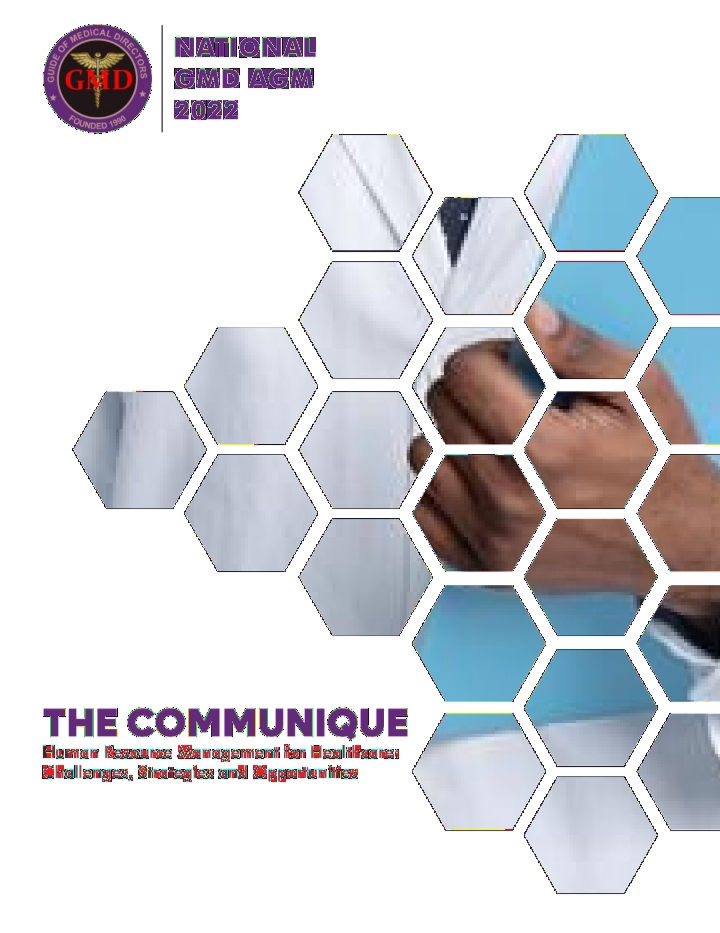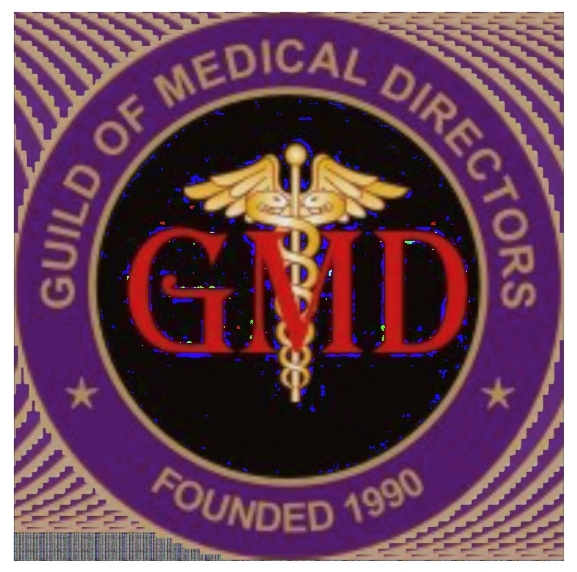A COMMUNIQUE ISSUED AT THE END OF THE ANNUAL GENERAL MEETING OF THE NATIONAL GUILD OF MEDICAL DIRECTORS HELD ON SATURDAY, DECEMBER 03, 2022

The National Guild of Medical Directors (GMD) held her Annual General Meeting (AGM) on Saturday, 3rd December 2022. The theme of the meeting was: Human Resource Management for Healthcare: Challenges, Strategies and Opportunities
At the meeting, healthcare professionals (H.E. Dr Zainab Shinkafi-BAGUDU, The First Lady of Kebbi State, MD/CEO Medicaid Radio Diagnostic Centre & Clinics, Abuja; Dr Amina Mohammed BALONI, Commissioner of Health in Kaduna State; Dr Kayode ADESOLA, President, Association of Nigerian Private Medical Practitioners; Dr Toyin AJAYI, MD, The Bridge Clinic; Dr Juliet ATUNE, Registrar in Anesthesia) and top human resource managers (Mr Usen UDOH, Senior Human Resources Executive; Mrs Bolanle ONIME, Senior Human Resource Executive, Chairman, Lagos Island Chapter of Chartered Institute of Personnel Management of Nigeria) brainstormed on why Nigeria is losing hundreds of healthcare personnel to brain drain.
They proffered several ways to stem or reverse the tide.
CAUSES OF BRAIN DRAIN
The key, pull (attractive factors that make working abroad more attractive) and push (negative factors that make working in Nigeria unattractive) causes of brain drain in the Nigerian healthcare sector can be classified under:
Reward and renumeration: Health workers earn considerably less in Nigeria.
Working environment: Poor working conditions and weak infrastructure with chronic
underfunding. This is compounded by increased workload and overwork for those who
remain in service.
Career opportunities and job satisfaction: Limited career opportunities for advancement compounded by political interference and the lack of performance-based promotion. This leads to low morale and poor attitude amongst the health workforce.
Security: The pervasive challenging political climate and insecurity is an important reason for uninhibited brain drain.
Governance: The lack of adherence to the Commonwealth Code of Practice for International Recruitment of Health Workers makes it easy for other countries to recruit medical professionals with impunity.
PROFFERED STRATEGIES FOR HEALTH INSTITUTIONS
The speakers identified key strategies that can be adopted by Government and private sector organizations to retain doctors in Nigeria and stop them from leaving the country permanently. These include:
- Organizations should provide career advancement programs and opportunities by investing in training, learning and development programs to keep abreast of new innovations.
- Develop and implement enhanced health sector salary and incentives schemes especially in deprived areas to improve quality of life.
- Skills such as effective communications, resilience, leadership, emotional intelligence, empathy, and quality assurance management must be actively taught to health professionals – starting early in schools. This will also help to improve communication channels and provide effective, ethical leadership and governance in healthcare institutions.
- Human Resources (HR) management is imperative to ease burnout and minimize dissatisfaction while improving work-life balance for healthcare professionals.
RESOLUTIONS AND TOP LEVEL STRATEGIES
Following robust discussions, the AGM resolved that:
1. Solutions to mitigate or reverse brain drain among healthcare workers in Nigeria must be practical and adopt a systemic approach. There are short and long-term strategies.
2. The large contingent of health workers in the diaspora is a pool of great resource that the nation can still benefit from through skills transfer, mentorship, and the use of technology (telemedicine). Proactive concerted steps must be taken to take advantage of these opportunities. We have to bring them back home.
3. Innovative approaches to increasing the pool of health workers available should be explored. These include:
a. Elimination of roadblocks (such as licensing of doctors) that discourage mid-level doctors from coming back to Nigeria even if for short stints or short periods.
b. Rehiring of retired physicians on retainership or contract basis to fill in the gaps created by doctors who have left the country and to also use their wealth of experience to mentor younger doctors.
4. GMD strongly urges the Government at the Federal, States and Local levels to create safe and enabling environment and provide generous incentives that will make it attractive for doctors and other health workers who have left the country to desire to come back home.
5. GMD will engage with government and all stakeholders in the following regards:
a. Implementation of the WHO policy that frowns at advanced countries poaching healthcare workers from developing nations. Promote multilateral negotiations between Nigeria and the key countries doctors and other health workers emigrate to so as to secure controlled emigration on more profitable terms for the country (e.g. The Philippines model).
b. Resuscitation of abandoned exchange program that allowed residents and other cadres of health workers to go overseas for a specified period for specialized training and then come back to give back.
c. Likewise Nigerian resident doctors in training in diaspora should be able to come home for short, specialized training periods that will be counted as part of the training of such residents.
d. Increase funding of the health sector to ensure adequate infrastructural development and renumeration of doctors and other health workers. Improve the pay to keep healthcare professionals in Nigeria.
e. Exemption of medical schools from university strikes should be passed into law.
Signed:
Dr. Raymond Abiodun Kuti
President, National Guild of Medical Directors





